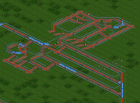Difference between revisions of "Junctionary - Logic and Other"
From #openttdcoop wiki
| (5 intermediate revisions by 3 users not shown) | |||
| Line 1: | Line 1: | ||
<noinclude>{{JunctionaryLogicAndOtherMenu}}</noinclude> | <noinclude>{{JunctionaryLogicAndOtherMenu}}</noinclude> | ||
| − | It is hard to describe logic shortly since it's very purpose is to do something extra. | + | It is hard to describe [[logic]] shortly since it's very purpose is to do something extra. This section lists mechanisms and thingies that usually control trains somehow, and thus improve how our network works. Although there are for sure cases that are completely useless like train counters. |
{{JunctionaryTableHeader|headline=Logic and other constructions <font size="small">([[Logic|what is that?]])}} | {{JunctionaryTableHeader|headline=Logic and other constructions <font size="small">([[Logic|what is that?]])}} | ||
| Line 20: | Line 20: | ||
{{Junctionary|11.01.11|[[Image:psg203_sparta.png|center|140px|]]|'''Long train abuse'''|This mechanism is meant to pack looong trains in just 3x3. It is very slow due to the effective more than 1xTL signal gap. |{{User|V453000}}|{{PublicServerGameSave|203}} }} | {{Junctionary|11.01.11|[[Image:psg203_sparta.png|center|140px|]]|'''Long train abuse'''|This mechanism is meant to pack looong trains in just 3x3. It is very slow due to the effective more than 1xTL signal gap. |{{User|V453000}}|{{PublicServerGameSave|203}} }} | ||
| − | {{Junctionary|11.01.11|[[Image:psg224_flipflop.png|center|140px|]]|'''Flipflop without memory'''|A very interesting way how to make a flipflop without memories, using the NOT gates swap their states. Unfortunately (probably) only usable for 1:1 split. |{{User|mfb}}|{{PublicServerGameSave|224}} }} | + | {{Junctionary|11.01.11|[[Image:psg224_flipflop.png|center|140px|]]|'''Flipflop without memory''' (SR-NOR latch)|A very interesting way how to make a flipflop without memories, using the NOT gates swap their states. Unfortunately (probably) only usable for 1:1 split. |{{User|mfb}}|{{PublicServerGameSave|224}} }} |
| + | |||
| + | {{Junctionary|16.10.12|[[Image:psg245_split_to_N.png|center|140px|]]|'''Pathfinder-based Perfect N-way split'''|A split from 1 to N (here 7) tracks. Fairly easy to build, with full throughput and does not seem to break. |{{User|V453000}}|{{PublicServerGameSave|245}} }} | ||
| + | |||
| + | {{Junctionary|2019-07-20|[[Image:3waysplit.png|center|140px|]]|'''Logic-based Perfect N-way split'''|A split from 1 to N (here 3) tracks. Fail-safe. |{{User|Hazzard}}|}} | ||
| + | |||
| + | {{Junctionary|2019-08-11|[[Image:Logic base1 counter.png|center|140px|]]|'''Base-1 (tally) counter'''|Train counter using memories as counting tally marks. Used for clock-synchronized SRNW. Allows N (6) trains per clock cycle. In this screenshot the input/output is in the top right with a testing dummy train. |{{User|Hazzard}}| {{PublicServerGameSave|334}}}} | ||
|} | |} | ||
Latest revision as of 19:05, 11 August 2019
| Logic and Other | |
|---|---|

|
Back to junctionary |
It is hard to describe logic shortly since it's very purpose is to do something extra. This section lists mechanisms and thingies that usually control trains somehow, and thus improve how our network works. Although there are for sure cases that are completely useless like train counters.
| Logic and other constructions (what is that?) | ||||||
|---|---|---|---|---|---|---|
| Date | Screenshot | Specification | Description | Creator | additional
| |
| 13/07/2008 | Train Length Sorter | Sorts trains by their length. In this example trains longer than 5 cars (or 2 tiles) will be sorted via the penalty, those of 5 cars or less through the non-penalty line. this is useful when trains of varying type use a station, and some platforms are shorter than others. It can also be used at junctions where there are two options of track, to move shorter trains onto a loop with tighter turns. Finally it may be used to seperate main line trains from local trains (assuming different train lengths). A local train may be forced onto a longer, slower loop to allow mainline trains to pass. | Audigex, original credit unknown. |
| ||
| 16/12/2008 | Advanced Timer | An advanced timer which works with a certain cycle. Once the dummy train finishes the cycle, a train is released by the timer. However this has one crucial condition - if a train overflows, the whole cycle is cancelled and the counting starts again. | Mark | Download PSG #121
| ||
| 11.01.11 | Train packing | The so called compressor. Waits until a few trains are ready to go and then releases them very close together, allowing trains further down the line join. | Mark | Download PSG #131
| ||
| 11.01.11 | Flipflop | A typical flipflop splitting trains into 6 directions equally. | V453000 | Download PSG #180
| ||
| 11.01.11 | Counter | A mechanism which counts how many trains have passed a certain spot. Completely useless for the network. | HDIEagle | Download PSG #196
| ||
| 11.01.11 | Counter/comparer | This array of stations had a special overflow which counted which station gets the least amount of trains and released trains to that. Therefore there are logic mechanisms which count how many trains have passed (based on Mark's clock) and a mechanism which says which station had gotten X trains as the last one. | V453000 | Download PSG #200
| ||
| 11.01.11 | Long train abuse | This mechanism is meant to pack looong trains in just 3x3. It is very slow due to the effective more than 1xTL signal gap. | V453000 | Download PSG #203
| ||
| 11.01.11 | Flipflop without memory (SR-NOR latch) | A very interesting way how to make a flipflop without memories, using the NOT gates swap their states. Unfortunately (probably) only usable for 1:1 split. | mfb | Download PSG #224
| ||
| 16.10.12 | Pathfinder-based Perfect N-way split | A split from 1 to N (here 7) tracks. Fairly easy to build, with full throughput and does not seem to break. | V453000 | Download PSG #245
| ||
| 2019-07-20 | Logic-based Perfect N-way split | A split from 1 to N (here 3) tracks. Fail-safe. | Hazzard |
| ||
| 2019-08-11 | Base-1 (tally) counter | Train counter using memories as counting tally marks. Used for clock-synchronized SRNW. Allows N (6) trains per clock cycle. In this screenshot the input/output is in the top right with a testing dummy train. | Hazzard | Download PSG #334
| ||










